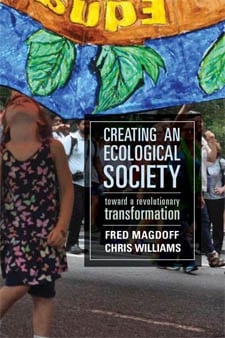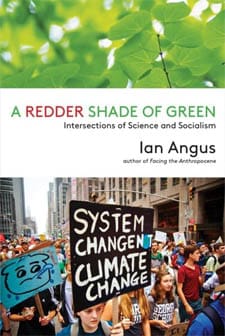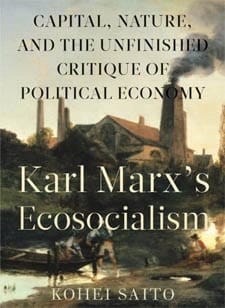Monthly Review has announced three important new books on the theory and program of Marxist ecology, to be published between May and August. All can be pre-ordered now from your favorite online bookseller, or directly from Monthly Review Press. The descriptions below are from the MR Press Spring 2017 catalog.
 CREATING AN ECOLOGICAL SOCIETY
CREATING AN ECOLOGICAL SOCIETY
Toward a Revolutionary Transformation
by Fred Magdoff and Chris Williams
Publication: May 2017
Sickened by the contamination of their water, their air, of the Earth itself, more and more people are coming to realize that it is capitalism that is, quite literally, killing them. It is now clearer than ever that capitalism is also degrading the Earth’s ability to support other forms of life. Capitalism’s imperative—to make profits at all costs and expand without end—is destabilizing the Earth’s climate, while increasing human misery and inequality on a planetary scale. Already, hundreds of millions of people are facing poverty in the midst of untold wealth, perpetual war, growing racism, and gender oppression. The need to organize for social and environmental reforms has never been greater. But crucial as reforms are, they cannot solve our intertwined ecological and social crises. Creating an Ecological Society reveals an overwhelmingly simple truth: Fighting for reforms is vital, but revolution is essential.
Because it aims squarely at replacing capitalism with an ecologically sound and socially just society, Creating an Ecological Society is filled with revolutionary hope. Fred Magdoff and Chris Williams, who have devoted their lives to activism, Marxist analysis, and ecological science, provide informed, fascinating accounts of how a new world can be created from the ashes of the old. Their book shows that it is possible to envision and create a society that is genuinely democratic, equitable, and ecologically sustainable. And possible—not one moment too soon—for society to change fundamentally and be brought into harmony with nature.
 A REDDER SHADE OF GREEN
A REDDER SHADE OF GREEN
Intersections of Science and Socialism
by Ian Angus
Publication: June 2017
As the Anthropocene advances, people across the red-green political spectrum seek to understand and halt our deepening ecological crisis. Environmentalists, scientists, and ecosocialists share concerns about the misuse and overuse of natural resources, but often differ on explanations and solutions. Some blame environmental disasters on overpopulation. Others wonder if Darwin’s evolutionary theories disprove Marx’s revolutionary views, or if capitalist history contradicts Anthropocene science. Some ask if all this worry about climate change and the ecosystem might lead to a “catastrophism” that weakens efforts to heal the planet.
Ian Angus responds to these concerns in A Redder Shade of Green, with a fresh, insightful clarity, bringing socialist values to science, and scientific rigor to socialism. He challenges not only mainstream green thought, but also radicals who misuse or misrepresent environmental science. Angus’s argument that confronting environmental destruction requires both cutting-edge scientific research and a Marxist understanding of capitalism makes this book an essential resource in the fight to prevent environmental destruction in the twenty-first century.

Capital, Nature, and the Unfinished Critique of Political Economy
by Kohei Saito
Publication: August, 2017
Karl Marx, author of what is perhaps the world’s most resounding and significant critique of bourgeois political economy, has frequently been described as a “Promethean.” According to critics, Marx held an inherent belief in the necessity of humans to dominate the natural world, in order to end material want and create a new world of fulfillment and abundance—a world where nature is mastered, not by anarchic capitalism, but by a planned socialist economy. Understandably, this perspective has come under sharp attack, not only from mainstream environmentalists but also from ecosocialists, many of whom reject Marx outright.
Kohei Saito’s Karl Marx’s Ecosocialism lays waste to accusations of Marx’s ecological shortcomings. Delving into Karl Marx’s central works, as well as his natural scientific notebooks—published only recently and still being translated—Saito also builds on the works of scholars such as John Bellamy Foster and Paul Burkett, to argue that Karl Marx actually saw the environmental crisis embedded in capitalism. “It is not possible to comprehend the full scope of [Marx’s] critique of political economy,” Saito writes, “if one ignores its ecological dimension.”
Saito’s book is crucial today, as we face unprecedented ecological catastrophes—crises that cannot be adequately addressed without a sound theoretical framework. Karl Marx’s Ecosocialism shows us that Marx has given us more than we once thought, that we can now come closer to finishing Marx’s critique, and to building a sustainable ecosocialist world.


